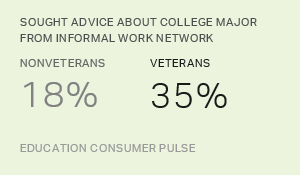Story Highlights
- Veterans more likely than nonveterans to seek advice from coworkers about major
- Still, informal social networks are veterans' top source of advice
WASHINGTON, D.C. -- Veterans with some postsecondary education are nearly twice as likely as nonveterans to have sought advice about their college major or field of study from people they've worked with -- 35% vs. 18%, respectively. In the case of veterans, people they worked with could include those they served with in the military.
| Veterans | Nonveterans | Overall U.S. adults | |||||||||||||||||||||||||||||||||||||||||||||||||||||||||||||||||||||||||||||||||||||||||||||||||
|---|---|---|---|---|---|---|---|---|---|---|---|---|---|---|---|---|---|---|---|---|---|---|---|---|---|---|---|---|---|---|---|---|---|---|---|---|---|---|---|---|---|---|---|---|---|---|---|---|---|---|---|---|---|---|---|---|---|---|---|---|---|---|---|---|---|---|---|---|---|---|---|---|---|---|---|---|---|---|---|---|---|---|---|---|---|---|---|---|---|---|---|---|---|---|---|---|---|---|---|
| % | % | % | |||||||||||||||||||||||||||||||||||||||||||||||||||||||||||||||||||||||||||||||||||||||||||||||||
| Informal social network | 44 | 56 | 55 | ||||||||||||||||||||||||||||||||||||||||||||||||||||||||||||||||||||||||||||||||||||||||||||||||
| Formal resources | 39 | 45 | 44 | ||||||||||||||||||||||||||||||||||||||||||||||||||||||||||||||||||||||||||||||||||||||||||||||||
| Informal school-based network | 20 | 34 | 32 | ||||||||||||||||||||||||||||||||||||||||||||||||||||||||||||||||||||||||||||||||||||||||||||||||
| Informal work-based network | 35 | 18 | 20 | ||||||||||||||||||||||||||||||||||||||||||||||||||||||||||||||||||||||||||||||||||||||||||||||||
|
Jan. 2-Aug. 13, 2017
Education Consumer Pulse |
|||||||||||||||||||||||||||||||||||||||||||||||||||||||||||||||||||||||||||||||||||||||||||||||||||
For veterans and nonveterans alike, the most common sources of advice for college major are informal social networks such as family and friends. But veterans (44%) are less likely than nonveterans (56%) to report that they consulted their informal social networks. Veterans are also less likely to cite informal school-based sources, like school teachers, coaches and faculty than are nonveterans -- 20% vs. 34%, respectively.
One possible reason veterans are more likely than nonveterans to seek out work-based sources is because veterans tend to be older when they attend college or a postsecondary education program. The average age of attendance of veterans is 30 compared with 26 for nonveterans.
However, veterans' higher reliance on work-based sources of advice is not just due to them being older when enrolling in college or postsecondary education. Even when comparing veterans and nonveterans in the same age groups, veterans are more likely than nonveterans to rely on work-based sources. Thirty-two percent of veterans aged 18-35 sought advice from work-based sources, compared with 16% of nonveterans that same age. Similarly, 36% of veterans aged 35-65, compared with 20% of nonveterans in the same age category, relied on work-based sources for advice. This suggests that there is something about veterans' unique work relationships and experience that helps explain why they seek out work-based sources.
These findings come from a report by Gallup and Strada Education Network, Major Influence: Where Students Get Valued Advice on What to Study in College. The data are from Gallup and Strada Education Network's Education Consumer Pulse -- a nationally representative, daily poll of 350 U.S. adults about their education experiences and perceptions. These findings are based on responses from more than 22,000 U.S. adults aged 18-65 who have some college education, an associate degree or a bachelor's degree.
Gallup asked U.S. adults with some postsecondary education or a degree to identify up to three sources they relied on for advice about their major or field of study. Gallup coded these open-ended responses into four major categories:
-
Formal sources: Counselors (high school and college) and the media (internet and print). This group represents sources that are intentionally designed to provide guidance to students about their education choices.
-
Informal social network: Family, friends and community leaders. These sources represent an informal network of advice and information for students but are not sources specifically designed to provide guidance to students about their education decisions.
-
Informal school-based: High school teachers, high school coaches, college faculty or miscellaneous staff. The preponderance of responses classified in this category cited professors, faculty or other types of instructors not primarily in an advising role.
-
Informal work-based: Employers, coworkers, people with experience in the field and military. The informal work-based category includes experiences gained while working and advice from people who work in particular fields.
While the sources of advice differ slightly among veterans and nonveterans, both groups rate the helpfulness of the advice they received similarly. And veterans (37%) are just as likely as nonveterans (36%) to say they would change their major if they could do it over again.


